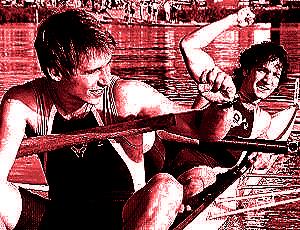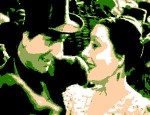Film Review
In a remarkable feature debut, director Bernard Bellefroid offers this
intensely poignant account of an adolescent rebelling against parental
abuse, not by launching into a vendetta against society but in more
positive way, through sporting achievement. Drawing on his own
traumatic experiences, Bellefroid effectively contrasts the
self-destructive violence of a father who wallows in his own
professional and personal failure with the more constructively
channelled aggression of the son who is determined not to follow his
example. The film has a raw brutal edge to it - domestic violence
is not something that is easy to watch even when simulated - but it is
also strangely uplifting, since it encourages us to believe that there
is a way out of one of the most pernicious of vicious circles; the
abused are not destined to end up as abusers.
The stark chiaroscuro tones inherent in the story are underscored by
some subtly evocative photography which conveys the changing mood of
the central protagonist Alex, the darkness of despair juxtaposed with
the sunniness of hope. Sensitively portrayed by Joffrey
Verbruggen (impressive in his first leading film role), Alex is a
complex and introverted character who exists in two worlds - the
cramped apartment which he shares with his oppressive father (which
look like a cross-between a dungeon and a torture chamber), and the
open spaces in which he trains for the rowing championships, which
represent freedom and the prospect of fulfilment. The scars that
Alex bears - both physical and mental - make it hard for him to accept
the help of others, but without their support he is doomed to remain
trapped in his domestic hellhole. It is the kindness of others -
primarily his trainer and his girlfriend - that allow Alex's own
humanity to emerge, giving him the moral strength to win his real
contest, which is not the eponymous rowing event, but the assertion of
his own identity.
La
Régate is a powerfully moving piece of drama -
intelligently scripted, beautifully composed and authentically carried
by a principal cast of exceptional
talent.
© James Travers 2010
The above content is owned by frenchfilms.org and must not be copied.
Film Synopsis
Alex is 15 and lives with his father, an oppressive and violent man
who, because of his drink problem, has difficulty holding down a
job. As a reaction to the daily ritual of abuse that his father
metes out to him, Alex takes refuge in his favourite sport, rowing,
which has become a personal obsession. Alex is determined to win
the Belgian rowing championship, despite his father's repeated attempts
to stop him. With the help of his coach, Sergi, and his
girlfriend, Murielle, Alex finally has a chance to realise his
potential and break free of the cycle of violence that has so far
blighted his life. Or so it seems...
© James Travers
The above content is owned by frenchfilms.org and must not be copied.


